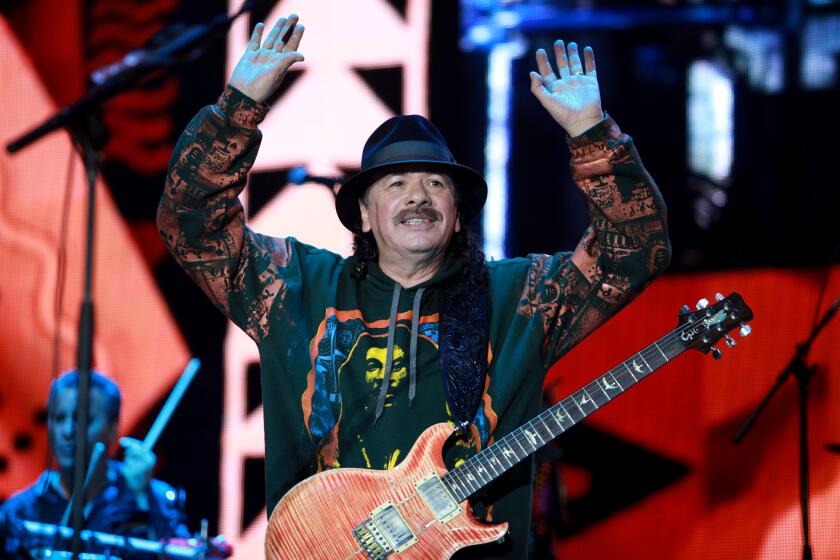Young, Gifted and Sounding Black : New Kids on the Block are the Osmonds with soul, sings their creator
- Share via
“There’s never been anything like it in the history of the record business,” boasted Maurice Starr, the Svengali behind the red-hot teen singing group, New Kids on the Block. “Nothing like it ever anywhere.”
The jabberings of a hustler?
Sure, there’s a bit of Muhammad Ali in Starr, a 34-year-old Florida native. But he does know his teen groups. Starr discovered New Edition and masterminded their early success.
In New Kids, he has something to brag about again. New Kids, who perform tonight at the Celebrity Theatre in Anaheim and return to the Universal Amphitheatre with Tiffany on June 25, are unique in some ways. This Boston outfit is certainly the biggest white teen group since the Osmonds were big stars in the late ‘60s and early ‘70s.
But what makes New Kids really different from any other successful white teen vocal group is their style. It’s black-- very black.
“These are white kids who are black,” Starr insisted. “They have white skins but they’re black. They have soul. They sing black. That’s how I taught them to sing.”
New Kids’ second album, “Hangin’ Tough” on Columbia Records, has sold more than 2 million copies. It includes three Top 10 singles, “Please Don’t Go Girl,” “The Right Stuff” and the current “I’ll Be Loving You (Forever).” This is the first teen vocal group to have three Top 10 singles from one album.
Something else, Starr noted, distinguishes New Kids.
“They have me as a manager,” he said, letting out a triumphant howl.
“A hit teen white group managed by a black man, a black man who also writes, produces and arranges their albums--who also created the group. That just doesn’t happen in this business.”
Starr, though, didn’t want to acknowledge exceptions--like black manager Russell Simmons’ guiding the white rappers, the Beastie Boys. “If it’s been done before, the black manager didn’t last,” Starr said. “He was probably replaced by a white manager.”
The Beasties’ new managers are white--Andy Slater and Howard Kaufman.
The success of New Kids, he insisted, vindicates black managers, who generally get a bad rap. “Black managers are always (being characterized) as crooked and incompetent,” he said.
“When black stars get big, they hire white managers. Look at Michael Jackson, Lionel Richie and all the rest. Some of these black artists may have black managers when they start out but when they get to a certain level, they hire white managers. That’s the way it’s always been.”
“When I first met Maurice I was very impressed,” said Donny Wahlberg, 19, of New Kids, in a separate interview. “He was a down-to-earth guy. Not somebody in a three-piece suit, but a regular guy.”
They met in 1984, when Starr and another manager, Mary Alford--who’s no longer associated with the group--were looking to form a young white singing group. The first recruit was Wahlberg, who, in turn, brought in his pals.
The other New Kids are Danny Wood, 18, Joe McIntyre, 16, and the Knight brothers, Jordan, 18, and Jon, 19. McIntyre replaced an original member who dropped out before the first album was recorded.
Wahlberg knew about Starr because of New Edition, the black bubble-gum group Starr discovered in 1983 and developed into a hit-making outfit--much like he’s done with New Kids. After one album, though, Starr’s relationship with New Edition turned sour, ending in a barrage of lawsuits. New Edition, of course, is still prospering, and former member Bobby Brown is becoming a superstar.
“What I had in mind for New Edition was making them the new Jackson 5,” Starr recalled. “With New Kids I wanted to re-create the Osmonds. . . . The Osmonds had talent but they didn’t have soul and they didn’t have enough good material. The New Kids are different from the Osmonds. They have talent and soul and good material--good black material.”
When Starr began working with New Kids, they were unpolished performers. “I wasn’t even a performer when I met Maurice,” Wahlberg said. “I was about 15. I’d been rapping and dancing. Three of the guys had done some singing. But none of us were experienced. He found me because he had spread the word in the neighborhood that he was looking for white kids to form a group. I was interested.”
Said Starr, “I was looking for kids with looks, charisma and determination, kids with average talent, kids with soul. I needed kids who knew the black culture and white kids who were hip enough to hang with blacks.”
Wahlberg, who grew up with the other group members, explained why they’re so knowledgeable about black culture.
“We grew up with black kids,” he said. “In first grade I was being bused to a school in an all-black area. We were all bused to black schools, all except Joe, the youngest guy in the group. He didn’t go to a black school but he still knows the black culture. Contrary to what the white racists think about busing, it was the greatest thing to happen to us.”
Musically, all the New Kids members were influenced by black artists. “Danny was a rapper just like I was,” Wahlberg said. “We all listened to a lot of R&B.; That’s what our friends were into. Singing black came natural to us. Some of the guys were really into the Stylistics.”
That partly explains why New Kids’ ballads are done Stylistics-style--smooth, soulful and ultra-romantic. Starr is very familiar with that style too. He did some composing and producing on two Stylistics’ albums.
Several of the group members sing leads, with Wahlberg and Jordan Knight handling the bulk of them. Two of the three hit singles have been ballads, spotlighting their falsetto skills. The New Kids show is now much more sophisticated. Track dates--singing to taped instrumentals--are a thing of the past. Since April, the group has had its own back-up band.
For the first few years, New Kids played black clubs and theaters, mostly in the Boston area. “We were known in black parts of town but not in the white parts,” Wahlberg said. “We played some tough places.” That was part of Starr’s master plan. “I didn’t want them to perform for white audiences,” he explained. “White audiences wouldn’t have been tough enough on them. They would have been impressed by the novelty of a white group singing black.
“But I wanted them to work for black audiences. They’re the tough audiences for a group like this. Right away, they’d see them a black rip-off. They’ll boo you off the stage. I knew when they were good enough to be accepted by black audiences, they were ready.”
Black audiences for the most part have liked New Kids, Starr insisted. But not all the time. “In their first show, they were booed off the stage,” he recalled. “At this one black festival some black people were throwing stones. The security people had to stop the show to get them off stage.”
None of this came as a surprise to New Kids. “We knew what we were doing wasn’t easy and that some black people wouldn’t accept us,” Wahlberg said. “Maurice had warned us.”
Weren’t the parents of the group members concerned about their youngsters’ hanging around black ghetto clubs and facing hostile situations?
“They probably were concerned but I never heard about it,” Starr said.
Starr emphasized that New Kids aren’t just clients. “These are like my own kids,” he said. “I practically raised these guys. I couldn’t feel closer to my own kids.”
The feeling, Wahlberg said, is mutual. “We’re very close to him. He’s been a very good teacher. I know when I started out I had never sung before. I was scared. I had no confidence in my singing. But he gave me confidence. He built us all up. He made us feel like we could do anything.”
This isn’t one of those overnight success stories.
Starr sold Columbia Records on New Kids, but the first album, “New Kids on the Block,” released in 1986, flopped. “We sounded like New Edition,” Wahlberg said. “It was a bubble-gum sound. It wasn’t bad, though.”
What doomed the album was its marketing plan. It was promoted to black radio, which rejected it. “It was a hard sell,” Starr recalled. “It had nothing to do with the music. Black radio was hesitant to play it because New Kids were white. That happens sometimes on black radio.”
The second album, “Hangin’ Tough”--released last year--started out the same way. Starr had tried to smooth the way for the album by taking tapes around to black radio months before the album’s release, but met with great resistance.
“Please Don’t Go (Girl)”--the album’s first single--was ignored at first by black radio. The second album, as well as the New Kids’ career, seemed finished. But pop radio came riding to the rescue.
Inspired by a video of the song, the single finally got some pop airplay and slowly became a Top 10 hit--pulling the album along with it. Three hit singles later, “Hangin’ Tough”--which didn’t make the pop charts until months after its release--has sold more than two million copies.
Despite Starr’s efforts, black radio has been slow to warm to New Kids. Each single has done progressively better, but none has been a black-chart blockbuster.
The New Kids members, though, long for that black acceptance. “It’s great to be a hit with the pop audience, but we want to make it with the black audience,” Wahlberg insisted. “These are black records we’re making. Black people more than any others should appreciate that. We feel a strong tie to the black audience. Once we’re a hit on black radio and with the black audience, then we’ve really made it.”
More to Read
The biggest entertainment stories
Get our big stories about Hollywood, film, television, music, arts, culture and more right in your inbox as soon as they publish.
You may occasionally receive promotional content from the Los Angeles Times.










